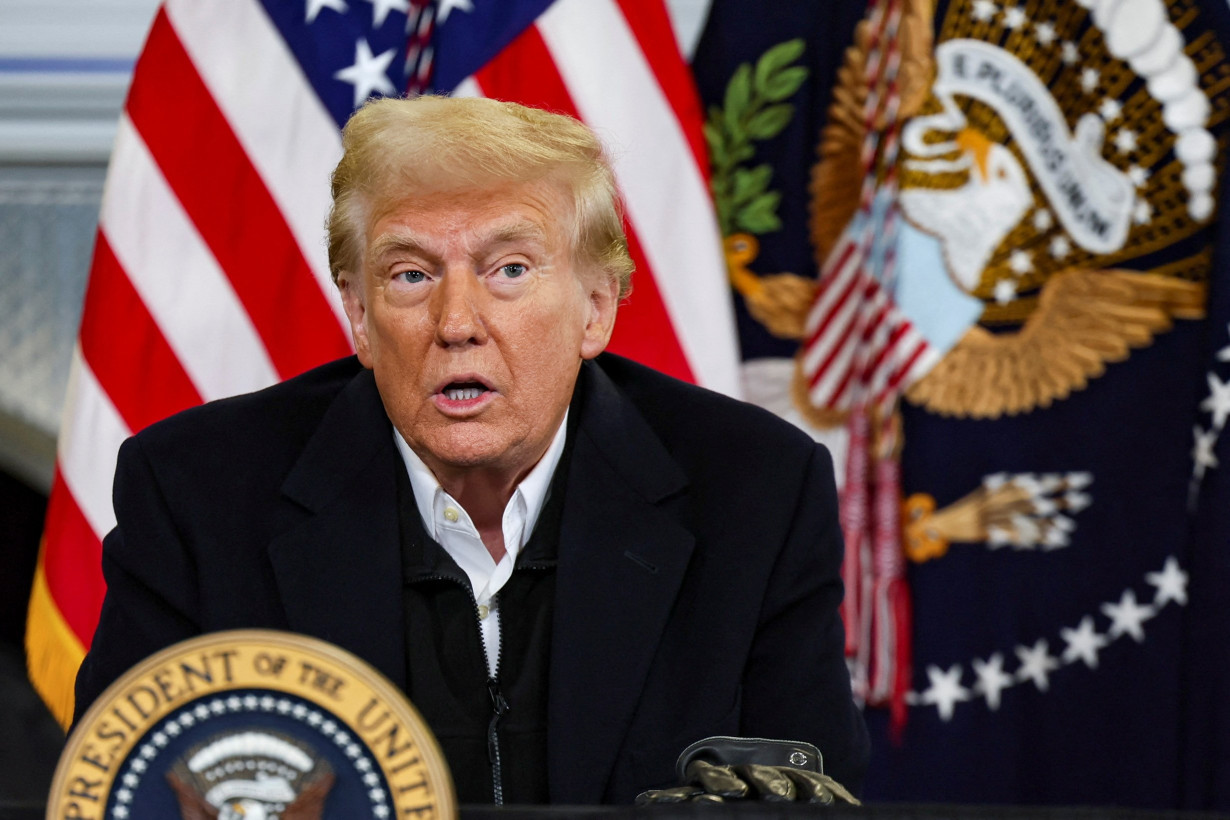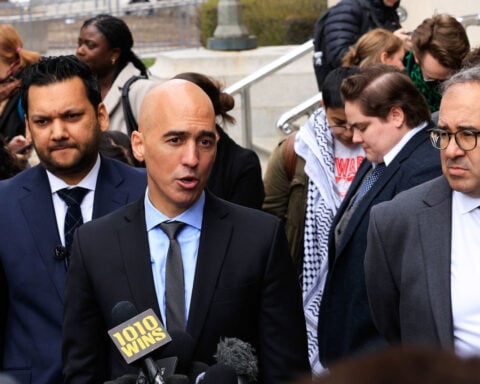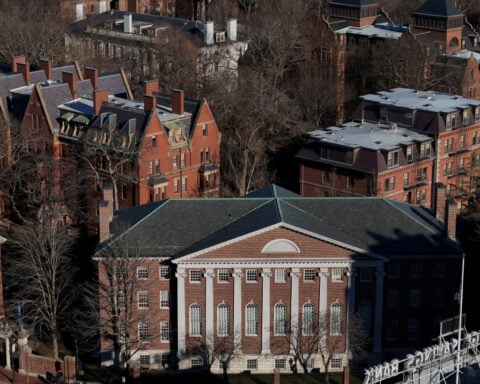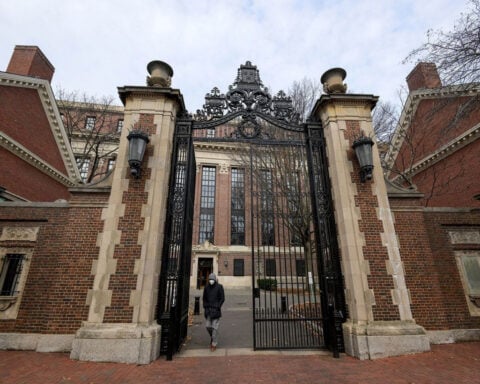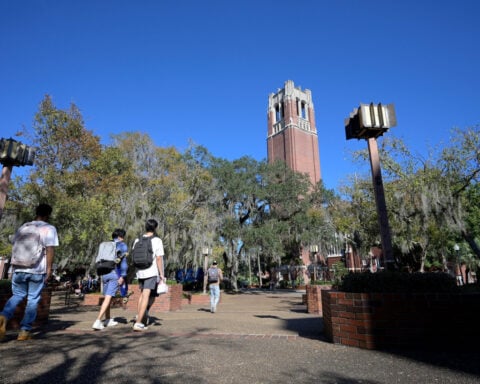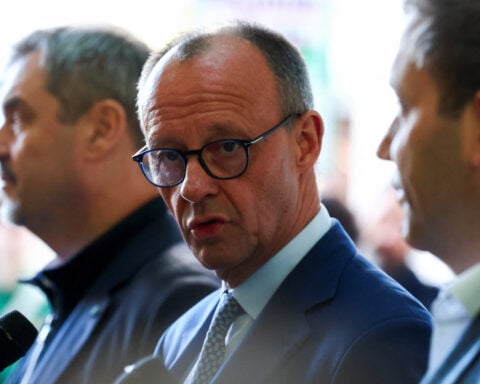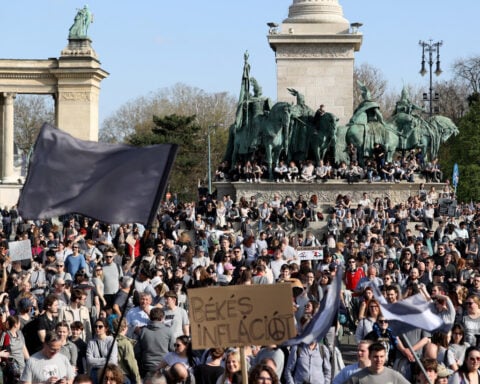By Helen Coster and Nathan Layne
(Reuters) -President Donald Trump on Wednesday signed executive orders to promote parental choice in school selection and end federal funding for curricula that he called the "indoctrination" of students in "anti-American" ideologies on race and gender.
The two directives, which come a week after Trump was sworn into his second term of office, are in keeping with his campaign promise to remake the country's education system in line with a rigorous conservative agenda that Democrats say could undermine public schools.
The first order directs the Department of Education to issue guidance on how states can use federal education funds to support "choice initiatives," without providing further details.
"It is the policy of my Administration to support parents in choosing and directing the upbringing and education of their children," the president said in the order. "Too many children do not thrive in their assigned, government-run K-12 school."
His second directive aims to stop schools from using federal funds for curriculum, teacher certification and other purposes related to "gender ideology or discriminatory equity ideology."
"In recent years, however, parents have witnessed schools indoctrinate their children in radical, anti-American ideologies while deliberately blocking parental oversight," it reads.
Trump and his allies throughout the campaign have accused public schools of teaching white children to be ashamed of themselves and their ancestors due to the country's history of slavery and discrimination against people of color.
The second order, without evidence, claims that teachers have been "demanding acquiescence" to concepts of "white privilege" or "unconscious bias" and thereby promoting racism and undermining national unity.
The executive order will have a “chilling effect” on subjects related to race and ethnicity in schools, said Basil Smikle Jr., a political strategist.
"I would imagine that it would restrict the kind of reading materials that are even available to students outside of the classroom,” he said.
Although that order does not invoke the term "critical race theory" by name, it employs the language often used by CRT opponents to criticize teaching about institutional racism.
A once-obscure academic concept, the theory has become a fixture in the fierce U.S. debate over how to teach children about the country's history and structural racism. An academic framework most often taught in law schools but not in primary and secondary schools, it rests on the premise that racial bias - intentional or not - is baked into U.S. laws and institutions.
Conservatives have invoked the term to denounce curricula they consider too liberal or excessively focused on America's history of racial discrimination. Supporters say understanding institutional racism is necessary to address inequality.
Christina Greer, an associate professor of political science at Fordham University, said the order came as no surprise.
"As a candidate, he said there was radical indoctrination of students," she said. "He’s making sure to frighten students and educators across the country so they can’t teach the real history of the United States."
It was not clear how the order issued on Wednesday would affect how the history of race relations is taught in American schools. During his inaugural address last week, Trump criticized education that "teaches our children to be ashamed of themselves — in many cases, to hate our country."
SCHOOL CHOICE
The first order also directs the U.S. Department of Education to prioritize federal funding for school choice programs, a longstanding goal for conservatives who say public schools are failing to meet academic standards while pushing liberal ideas.
Many Democrats and teachers' unions, on the other hand, say school choice undermines the public system that educates 50 million U.S. children.
Federal test scores released by the National Assessment of Educational Progress on Wednesday underscored the challenge faced by educators in the wake of widespread learning loss during the COVID-19 pandemic.
The scores showed that one-third of eighth graders tested below NAEP's "basic" reading level, the most in the test's three-decade history, while some 40% of fourth-graders also fell below that basic threshold.
That executive order also directs U.S. states on how they could use block grants to support alternatives to public education, such as private and religious schools.
U.S. education is primarily funded via states and local taxes, with federal sources accounting for about 14% of the funding of public K-12 schools, according to Census data.
Trump's order could affect some $30 billion to $40 billion in federal grants, estimated Frederick Hess, an education expert at the right-leaning American Enterprise Institute.
"This stuff is directionally significant," said Hess, adding that Trump's directive represented "the most emphatic support for school choice we've ever seen at the federal level.”
The first order also calls for allowing military families to use Pentagon funds to send their children to the school of their choosing. It also mandates that Native American families with students in the Bureau of Indian Education be allowed to use federal funds in selecting their schools.
A number of Republican-leaning states have in recent years adopted universal or near-universal school choice policies, paving the way for vouchers or other methods that allocate taxpayer funds for homeschooling or private tuition.
Josh Cowen, a professor of education policy at Michigan State University, said that Trump's executive order is aimed at sending "an aggressive statement about his position on vouchers" even if his power to reallocate funds is limited.
Cowen said the bigger potential financial impact on education lies with a bill reintroduced in Congress this week that would create a federal school voucher program with an estimated $10 billion in annual tax credits.
(Reporting by Andrea Shalal, Jeff Mason, Susan Heavey, Nathan Layne, Bianca Flowers and Helen Coster; Editing by Frank McGurty, David Gregorio and Deepa Babington)

 Trump has begun another trade war. Here's a timeline of how we got here
Trump has begun another trade war. Here's a timeline of how we got here
 Canada's leader laments lost friendship with US in town that sheltered stranded Americans after 9/11
Canada's leader laments lost friendship with US in town that sheltered stranded Americans after 9/11
 Chinese EV giant BYD's fourth-quarter profit leaps 73%
Chinese EV giant BYD's fourth-quarter profit leaps 73%
 You're an American in another land? Prepare to talk about the why and how of Trump 2.0
You're an American in another land? Prepare to talk about the why and how of Trump 2.0
 Chalk talk: Star power, top teams and No. 5 seeds headline the women's March Madness Sweet 16
Chalk talk: Star power, top teams and No. 5 seeds headline the women's March Madness Sweet 16
 Purdue returns to Sweet 16 with 76-62 win over McNeese in March Madness
Purdue returns to Sweet 16 with 76-62 win over McNeese in March Madness
